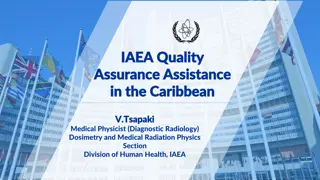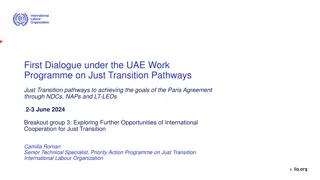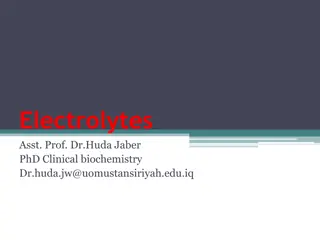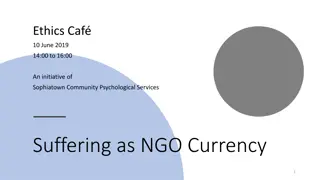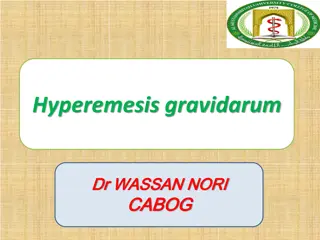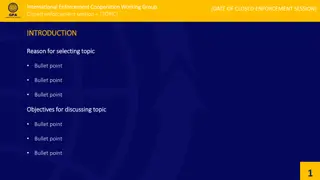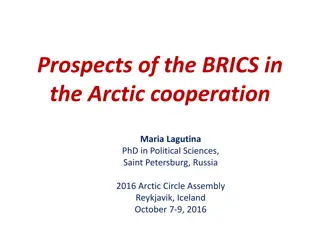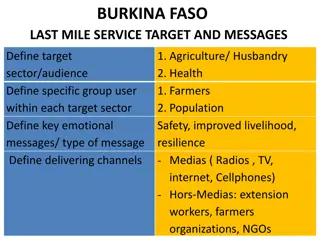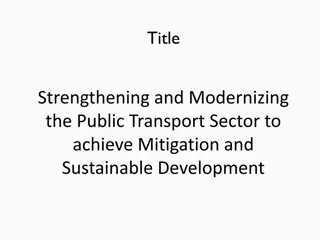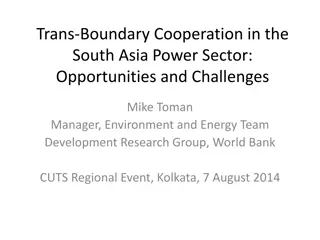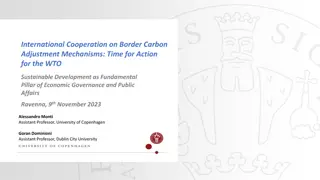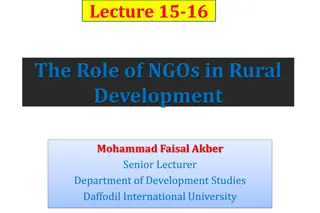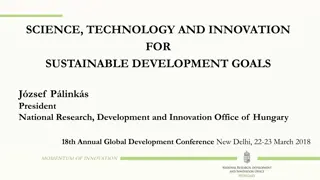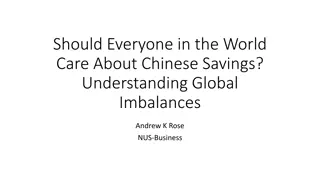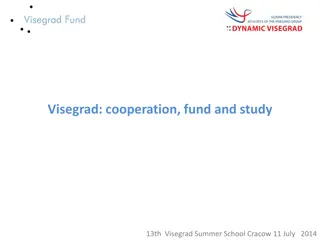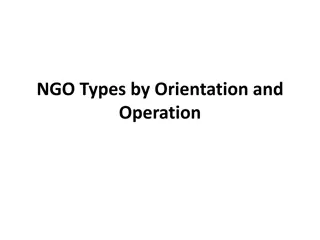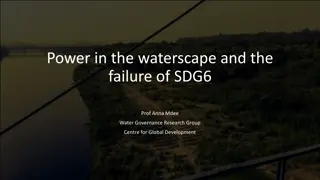NGOs' Role in Addressing Imbalances in International Cooperation for Sustainable Development
NGOs play a crucial role as pillars for achieving Sustainable Development Goals (SDGs) by bridging the gap between citizens and public authorities, fostering collaboration among various stakeholders, and aligning global, national, and local agendas. With the shift in international cooperation policies, particularly in Middle-Income and Upper-Middle Income Countries, exploring the evolving role of NGOs becomes essential in promoting sustainable development and addressing imbalances in the changing paradigm of cooperation.
Uploaded on Sep 12, 2024 | 0 Views
Download Presentation

Please find below an Image/Link to download the presentation.
The content on the website is provided AS IS for your information and personal use only. It may not be sold, licensed, or shared on other websites without obtaining consent from the author. Download presentation by click this link. If you encounter any issues during the download, it is possible that the publisher has removed the file from their server.
E N D
Presentation Transcript
Role of NGOs in Sustainable Development: Addressing Imbalances from the Shift in the Cooperation between Middle and Upper-Middle Income Countries (II) Joint Presentation at the Inaugural Conference of the Centre and Institute for Innovation and Sustainable Development , March 2019 PhD. Enriqueta Serrano Caballero Marianne Ojo PhD
Introduction NGOs are recognized as pillars for the implementation of Sustainable Development Goals (SDGs), with the understanding that the State and its institutions cannot achieve the objectives of the 2030 Agenda by themselves. This situation is reflected in the very design of the 2030 Agenda, since, this sector had a very important role in the accompaniment of the initiatives, thematic consultations, contribution in terms of inputs and experiences, their participation in the process was generated in the form of coalitions organized by sectors, countries and regions.
NGOs have played an important role in the change and transformation of society. From a working approach based on human rights, NGOs are a necessary bridge between citizens and public authorities, in the search for balance between social demands and the response capacity of public authorities. There is a need for spaces in which all the actors involved in the implementation of the SDGs can collaborate on a permanent basis: government, the business sector and those belonging to the NGOs, with various objectives: The strengthening of their capabilities Establish synergies for action the 2030Agenda Aligning the global , national and local agendas Feedback on the work done around
One of the major changes in the new EU cooperation policy is the disappearance of bilateral cooperation aimed at Middle-Income Countries and Upper-Middle Income Countries. Therefore, from the inclusion of new actors to achieve the Sustainable Development Goal, this chapter aims to explore the role and involvement of NGOs in the new changes, transformations and imbalances of this new paradigm of international cooperation of the European Union.
NGOs and Sustainable Development The new international agenda for development focuses on the eradication of poverty, the reduction of inequalities and sustainable development as an indivisible whole, in which human rights must be a basic pillar. The current realities of international governance have encouraged an increase in the participation of non-state actors in policy elaboration and their implementation strategies at different levels. The work of the organizations of the Third Sector has been intense since the SDGs were put in place, as they constitute an exceptional normative framework for the demands of this sector.
When it comes to international governance, NGOs have a crucial role to play as well. The importance of the participation of civil society in intergovernmental deliberations and global policy-making is deemed an indispensable component of effective global action. The United Nations (UN), after the declaration of the 21 Agenda at the 1992 Earth Summit, recognizes that Nongovernmental Organizations (NGOs) have been playing a critical role in aiding socioeconomic progress in countries where government resources and reach are not enough to meet the demands.
NGOs bring several advantages to the international cooperation dynamic: they provide knowledge of the local context of the area where they are active and the challenges present in there; they can rely on close contact with key local actors to address these problems; they usually have networks with other civic organizations, and other institutions from the public and private sectors; they are capable of providing knowledge that may not be easily accessible to outsiders; they are well placed to perform activities that governments, businesses or international organizations may not be willing to risk or are unable to carry out; They contribute by bridging the gap between the civil society of developed countries and that of developing countries by solidarizing them and creating opportunities for the movements of people, ideas and resources.
Despite all of these advantages, there are some aspects to the inherent nature and functioning of NGOs that could potentially limit their capacities as international actors in the context of cooperation for sustainable development: The lack of sufficient funding or a shaky flow of income may constrain their potential to tackle global problems on a large scale or for long periods of time. There must be an active effort to prevent the larger organizations to hoard all the opportunities to make an impact, and keep spaces open to the smaller organizations. NGOs also have different accountability structures that vary greatly and in some cases are not quite transparent, which negatively affects their ability to present themselves as legitimate representatives of civil society. Some people suggest NGOs could be interfering in the actions of a democratically elected government that is answerable to the people in a way that these organizations are not, and in a way that might be usurping the sovereign powers of government.
NGOs could serve as the link that provides those interests that emanate from the public sector and are not reflected in the market logic, with an opportunity to have a seat at the table of negotiations and participate in the work on the ground. That is not to say that these organizations must be regarded as a panacea. There must be both ambitious and realistic expectations about the role that they get to play in this context; each NGO has very different capacities, desires, and suitability to make an impact. There are certain problems that surpass individual NGOs faculties and must be addressed by entities that are better suited to make structural changes.
As stipulated in the Treaty of Lisbon (2009), international cooperation for development is one of the most important aspects of the EU s foreign action. It is centered on the combat against poverty and the promotion of sustainable growth; also, the fight for human rights, democracy, and gender equality is of paramount significance. The main objective of the EU policy in this area will be the reduction and, finally, the eradication of poverty, it also pursues the objectives of the EU's external action, in particular, those set out inArticle 21 paragraph 2
The EU plans to base its commitment to sustainable development to two main pillars: governance and financing. The European Commission (2016) states that sustainable development should be regarded as a governance issue that requires appropriate instruments to make sure political coherence in the various thematic areas, as well as between the EU's external action and its other policies. The Commission has incorporated the economic, social and environmental dimensions that make up the core of the SDGs, in the EU budget and expenditure programs.
The EU acknowledges that coordination and support among all levels of government are of the utmost importance if SDGs are to be achieved. Civil society also plays a part in this scheme of collaboration as boosters of citizen participation and good governance. The central institutions of government in the EU are committed to incorporate international organizations, civil society organizations, and individual citizens in the implementation of the 2030 Agenda, both in Europe and outside the Union s frontiers.
The EUs cooperation tools in relation to civil society Each tool available to the EU comes with a set of strengths and weaknesses that should be kept in mind when making use of them; moreover, each tool relates in a different way to the parties involved in cooperation for development. The added value that civil society, particularly NGOs, bring to the table when it comes to cooperation for development acquires different dimensions and potentials according to their relationship with the cooperation tools they come in contact with.
Political dialogue : Political dialogue for development can be a good way for establishing a common vision and a more integrated agenda, especially when a wide range of actors is brought to the table; civil society, academia, enterprises and trade unions could prove to be key allies. Nevertheless, the EU needs to be flexible enough to adapt its discourse and intervention to the specific context in which the dialogue takes place, in other words, different countries have different demands and particular existing challenges to sustainable development. There are several examples in which the EU has been successful in combining the allocation of budgets with creative and inclusive political dialogue centered on policy development; according to the European Commission, successful stories can be found in Cambodia (education), Paraguay (social policy), Morocco (private sector).
Grants: While the role of economic grants has been diminished when it comes to collaboration with most Middle-Income Countries (MIC) and Upper-Middle Income Countries (UMIC), well located resources can go a long way, especially when it comes to supporting local NGOs. The strategic use of grants in support of actors beyond the State are a viable way of ensuring a smooth transition for countries that are graduating out of official development aid and acquiring a middle income status.
Blending: The combination of loans and equity investments of public and private financiers with EU grants can be of great value for the development of creative enterprises and for supporting sectors that have job creating potential. Further it facilitates the accommodation of projects of bigger dimensions that would not have been possible when relying on grants alone. Blending should be accompanied with technical assistance and political dialogue in order to gain a more coherent approach, as well as, a careful consideration of the partners and solid accountability mechanisms.
Technical assistance and Information Exchange(TAIEX) : Programs such as MIEUX/Migration EU exchange, SOCIEUX+, COM SSA/Covenant, and PALOP-TL; have integrated the sharing of EU expertise in needs-based and efficient collaborative approaches in neighboring countries and countries that solicited help across the globe. The advantages of this kind of cooperation include its capability of rapid mobilization and the ability to be tailor-made to the specific needs of the context where it is going to be inserted. On the other hand, there have been some difficulties when applying this approach, particularly regarding the mobilisation of staff
Mediation: The EU can capitalize on being a facilitator of South South and Trilateral cooperation, since these approaches to cooperation, have been identified as being central to the implementation of the 2030Agenda. This type of cooperation is characterized by the greater levels of ownership and horizontality that this approach confers, through the notion of involving two developing countries, an engagement which would promote the establishment of a more symmetrical relationship than the one that has characterized the traditional North-South cooperation and the impulse of initiatives closer to the needs of the receiving partner. In this process, the involvement of NGOs that are better familiar with the local context could generate a broader input that could counterbalance an unsymmetrical situation.
The role of civil society is highlighted in the New Consensus for Development of the EU (2017) on issues such as strengthening resilience and sustainability in the application of durable solutions to the most complex global challenges. The New Consensus recognizes that one of the fundamental challenges for the effectiveness of development efforts is the reduction of spaces for the participation of civil society. Therefore, the search for integrating responsible societies with democratic institutions is proposed, thus supporting initiatives that promote open and favorable spaces for the participation of civil society, political dialogue being one of the most important tools for these platforms of action and not only for partner governments.
Conclusions The EU must ensure each of the points set out in the 2017 Development Consensus, are taken into account when it adopts and proposes solutions for current problems in line with the 2030 Agenda. In this sense, it is necessary to follow up all the mechanisms and instruments both inside and outside the EU, in which the work of the NGOs is one of the main axes, in particular, the joint programming of cooperation between partners and the development of association modalities and knowledge management that derive from good practices that could be replicated.
References Convergence (2017). Case Study: Seychelles Debt Conversion for Marine Conservation and Climate Adaptation. March 2017 www.convergence.finance Di Ciommo, M., & Say s, M. (2018). Sailing new waters in international cooperation. On the way to framing future EU's engagement with more advanced developing https://euagenda.eu/upload/publications/sailing-new-waters-in-international-cooperation.pdf. (Accessed August 10, 2018). Ecdpm (2018), Opening new roads in international cooperation. Forging future collaboration between the EU and the most advanced developing countries. Online (Accessed on 14/09/2018) countries. March 2018) Online European Commission (2011), Joint Communication to the European Parliament and the Council, the Council, the Economic and Social Committee and the Committee of the Regions, "Increasing the impact of the EU's development policy: Program for Change". (COM (2011) https://eeas.europa.eu/sites/eeas/files/com_com20110637_en.pdf. (Accessed August 5, 2018). European Commission (2017). New European Consensus on Development. Our world, our dignity, our future . Brussels, 30.06-2017 https://ec.europa.eu/europeaid/sites/devco/files/european-consensus-ondevelopment-final-20170626_en.pdf (Accessed on 14/09/2018) 637final), Brussels, October 13 Online European Parliament. (2018). Development policy: general summary. Obtained from technical sheets on the European Union: http://www.europarl.europa.eu/atyourservice/en/displayFtu.html?ftuId=FTU_5.3.1.html (Accessed 1-07-2018).
References (contd) International Institute for Sustainable Development (2011). Climate Change and Fragile States: Resilient Development and the Struggle for Security Workshop Report Climate Change and Fragile States Workshop September 28-29, 2011 Lifegate (2016). Seychelles Swaps Millions of Dollars in Debt in Exchange for Conserving its Ocean https://www.lifegate.com/people/news/seychelles-debt-swap Leonardo DiCaprio Foundation. (2016). LDF Supports First Ever Debt for-Nature Swap in Seychelles. MANAGING AID IN CONFLICT AND TRANSITION (2018). Soria, Ana. Cristina. Alonso; Huang, C., Kanson-Benanav, S., Lizzie Martin, Rachel Rothgery, Nicole Russo, Ellen Steele, Mili C. Varughese, Teresa Wolverton, Amber Zuberi News Agency (2015). Swapping Seychelles Debt for Ocean Conservation Milestone Agreement Reached with Paris Club Creditors Accessed 2018 http://www.seychellesnewsagency.com/articles/2463/Swapping+Seychel les+debt+for+ocean+conservation++milestone+agreement+reached+wit h+Paris+Club+creditors
References Official Journal of the European Union (2010), Consolidated versions of the Treaty on European Union and the Treaty on the Functioning of the European Union ((C 83 / del 30. .3.2010), Brussels, 03.30.2010. (Online http://eur-lex.europa.eu/legal-content/ES/TXT/PDF/?uri=OJ:C:2010:083:FULL&from=ES) (Accessed 1-09- 2018) Official Journal of the European Union. (2017). Opinion of the European Committee of the Regions: Proposal for a New European Consensus on Development: Our world, our dignity, our future . Brussels. Retrieved from https://eur-lex.europa.eu/legal-content/ES/TXT/PDF/?uri=CELEX:52016AR6940&from=ES. (Accessed 1-07-2018) Official Journal of the European Union. (2017). Opinion of the European Committee of the Regions - Next steps for a sustainable European future - European action for sustainability. Online https://eur- lex.europa.eu/legal-content/ES/TXT/PDF/?uri=CELEX:52017AR0137&from=ES. (Accessed 1-07-2018). Paris Club. (2015). Paris Club and Seychelles Agree to a Deal to Support Ocean Conservation The Guardian (2018). Debt for Dolphins: Seychelles Creates Huge Marine Parks in World-first Finance Scheme https://www.theguardian.com/environment/2018/feb/22/debt-fordolphins-seychelles-create-huge- new-marine-parks-in-world-firstfinance-scheme
References Marianne Ojo and Enriqueta Serrano Caballero (2018). From Nature Swaps to Dolphin Swaps : The Paris Club, Nature Conservancy and Role of Non Governmental Organizations in Sustainable Development Woodrow Wilson School of Public & International Affairs Princeton University January 2018



